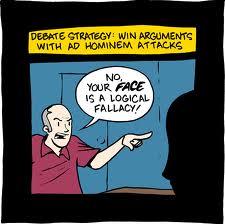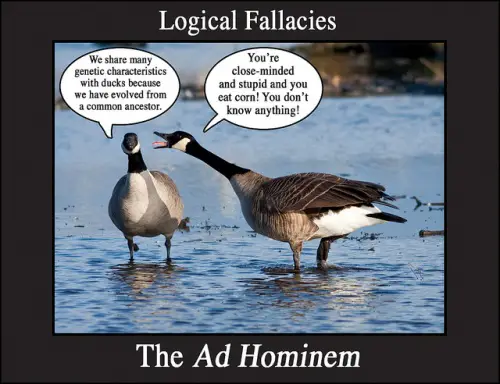Thinking Rightly in Apologetics
Logic
What is Logic?
Logic is the study of right reason and valid inferences. It deals with fallacies of right reason. It is a way to think so that we come to correct conclusions.
We also need to know when A implies B. If my 2 year old son Paxton has a crayon in his hand and the wall is marked up with a crayon, should I infer that Paxton marked on the wall? We have rules for making inferences.
A fallacy is simply a mistake. A logical fallacy is a mistake in reasoning.
Further definitions
Proposition: A statement designated true or false. “All mammals have kidneys” as well as “no mammals have kidneys” are alike propositions. One is true and one is false.
Argument: consists of two or more propositions with a resulting conclusion.
This is a complete argument since the third proposition claims to be true. This is also a syllogism[1].
For the above argument to be true, both premises (1 and 2) as well as the conclusion (3) must be true. The conclusion must rationally follow or be very likely to follow.
A logical fallacy occurs when, even though the premises are true, an incorrect conclusion is drawn.

Or my favourite. Haddie, my 5 year old girl [age in this picture, she’s 11 now…] said…

Haddie, “Mommy, Alesha is like a horse.”
Mommy, “hhmmmm…”


Mommy, “Really, how so?”
Haddie, “I love them both!”
In effect, Haddie said…
Other mistakes in reasoning are not just from a faulty conclusion, but faulty premises.
1. All dogs are mammals (T)
2. All mammals are reptiles (F)
3. Therefore, all dogs are reptiles (F)
If premise one and premise two were both true, then the conclusion would also be true. But obviously premise two is faulty. This makes the conclusion unreliable.
http://www.youtube.com/watch?v=zrzMhU_4m-g
Syllogism #1
Syllogism #2
(Assumed: Weight alone determines whether something floats.)
Conclusions
Therefore, a woman who weighs as much as a duck is made of wood.
Therefore, a woman who weighs as much as a duck is a witch.
Therefore, burn the witch.
Witches are burned, but wood is also burned, and wood floats, but ducks also float, so, if someone weighs the same as a duck, she’s made of wood, therefore, she’s a witch
My question based on the above …
Kinds of Logic
Logic can be inductive or deductive. Inductive means the conclusion is likely to be true whereas a deductive argument has a conclusion that is definitely true. Of course, this depends on if the premises are true.
Inductive arguments are further classified as either strong or weak.
Example of an inductive argument.
This is a perfectly logical conclusion however, if we had more information, it would alter our conclusion. For example, if we knew that you were driving, that might alter our conclusion.
Syllogisms
Logical Fallacies
(add “argumentum ad futuris”; http://www.reasons.org/articles/god-of-the-gaps-or-best-explanation)
[add the taxicab fallacy by pruss. How atheists throw out their own logic.]
The following from http://blog.geekpress.com/2006/09/excellent-list-of-logical-fallaciesad.html. Modified to be appropriate.
Game: Picture each logical fallacy trying to convince you that it is the best logical fallacy around. Here are their arguments.
Genetic http://www.apologeticspress.org/APContent.aspx?category=12&article=4133
Ad Hominem: Attacking the arguer instead of the argument.
“This is the best logical fallacy, and if you disagree with me, well, you smell bad.”


“Candidate George’s proposal about zoning is ridiculous. He was caught cheating on his taxes in 2003.” That doesn’t mean his zoning proposal is ridiculous.
Appeal To Authority: Legitimate authorities on a subject speaking on their areas of expertise may affirm a falsehood.
“Other logical fallacies aren’t logical fallacies at all because Einstein said so. Einstein also said that “appeal to authority” is best.”
Bobby said, “As Aristotle said, arguments from an appeal to authority are invalid.”

Appeal To Emotion: An argument is made due to the manipulation of emotions, rather than the use of valid reasoning.
This fallacy says, “See, my mom, she had to work three jobs on account of my dad leaving and refusing to support us, and me with my elephantitis and all, all our money went to doctor’s bills so I never was able to get proper schooling. So really, if you look deep down inside yourself, you’ll see that my fallacy here is the best.”
Develop Confirmation Bias: https://www.youtube.com/watch?v=v1QUfGN5OE0
https://www.youtube.com/watch?v=Kho5KvPBDSw&vl=en
-can you catch the bias in this video? [science vs religion]
Appeal to Fear: an argument is made by increasing fear and prejudice towards the opposing side
Appeal to fear says, “If you don’t accept Appeal to Fear as the greatest fallacy, then THE TERRORISTS WILL HAVE WON. Do you want that on your conscience –that THE TERRORISTS WILL HAVE WON because you were a pansy who didn’t really think that Appeal to Fear was worth voting for, and you wanted to vote for something else? Of course not, and neither would the people you let die because THE TERRORISTS WILL HAVE WON.”
Pascal’s Wager
Bad argument. Believing in God’s existence is not the only thing required for ‘gain’ anyway. James 2:19
Appeal To Force: an argument made through coercion or threats of force to support a position.
“If you don’t agree that Appeal to Force is the greatest logical fallacy, I will punch you in the face.”

Appeal To Majority: A proposition is claimed to be true or good solely because many/most/majority of people believe it to be so.
Appeal To Numbers:
Appeal To Novelty: where a proposal is claimed to be superior or better solely because it is new or modern.
Works the other way too…
Appeal To Tradition:
Argumentum Ad Nauseam: is an argument made repeatedly (possibly by different people) until nobody cares to discuss it any more. This may sometimes, but not always, be a form of proof by assertion.
Begging the Question: This is where the conclusion of an argument is implicitly or explicitly assumed in one of the premises.
Circular reasoning is the best fallacy and is capable of proving anything.
Since it can prove anything, it can obviously prove the above statement.
Since it can prove the first statement, it must be true.
Therefore, circular reasoning is the best fallacy and is capable of proving anything.
Example
Bill: “God must exist.”
Jill: “How do you know?”
Bill: “Because the Bible says so.”
Jill: “Why should I believe the Bible?”
Bill: “Because the Bible was written by God.”
“If such actions were not illegal, then they would not be prohibited by the law.”
Burden Of Proof: is the obligation on a party in a dispute to provide sufficient warrant for their position.
Burden of Proof says, “Can you prove that Burden of Proof isn’t the best logical fallacy?”
The point is that Burden of Proof must prove that it is the best, not just put the burden in your lap.
http://www.reasonablefaith.org/must-an-atheist-be-omniscient-re-visited
http://www.reasonablefaith.org/must-the-atheist-be-omniscient
Complex Question: someone asks a question that presupposes something that has not been proven or accepted by all the people involved. This fallacy is often used rhetorically, so that the question limits direct replies to those that serve the questioner’s agenda.
“Have you stopped beating your dog and saying Complex Question isn’t the best fallacy?”
False Dilemma: two alternative statements are held to be the only possible options, when in reality there are more.
“I’ve found that either you think False Dilemma is the best fallacy, or you’re a terrorist.”

Gambler’s Fallacy: if deviations from expected behaviour are observed in repeated independent trials of some random process, future deviations in the opposite direction are then more likely.

Gambler’s Fallacy says, “Since you haven’t decided that I am the best logical fallacy yet, you will now.”
Guilt By Association: arguing that because two things share a property they are the same
Guilt By Association says, “You know who else preferred those other logical fallacies?”


So, mine is obviously the best!”
Non Sequitur: is an argument in which its conclusion does not follow from its premises.
“None of my meals today have involved asparagus.
Therefore, Non Sequitur is the best fallacy.”
Scientific study has proved that there is a naturalistic cause of the universe.
Therefore, a god doesn’t exist.
[God could have created the universe in such a way that it looks like that]
Post Hoc/False Cause: X happened after Y happened (time); therefore X caused Y (causation)
“Since I’ve started presuming that correlation (time) equals causation, violent crime has gone down 54%. Therefore, vote post hoc.”



Red Herring: a speaker attempts to distract an audience by deviating from the topic at hand by introducing a separate argument which the speaker believes will be easier to speak to.

Relativism: asserting that truth is relative.
“Well maybe all those other fallacies are the best for you, but to me, the relativist fallacy is the greatest logical fallacy ever.”

That’s funny b/c nobody really thinks that way. If you follow their thinking to its logical conclusion, what Calvin said is what they would say!
Slippery Slope: asserting that a relatively small first step inevitably leads to a chain of related events culminating in some significant impact.
Slippery slope says, “If you don’t like Slippery Slope arguments, you will do poorly in class, drop out of school, commit crimes, go to prison, and die of AIDS.”
Appeal to Ignorance: assuming that a claim is true because it has not been proven false or cannot be proven false
“No one has been able to prove that another fallacy is better than Appeal to Ignorance, so it must be the best.”
“You can’t prove God exists. Therefore, God doesn’t exist.”
“You can’t prove God doesn’t exist. Therefore, God exists.”
Equivocation: the misleading use of a term with more than one meaning (by glossing over which meaning is intended at a particular time
“The best fallacy is on this list.
Equivocation is on this list.
Therefore, the best fallacy is equivocation.”
What 2 words are equivocated?
best fallacy and Equivocation

False Analogy:
“Just as the jelly donut is the best donut, so too is False Analogy the best fallacy.”

Straw Man Argument: an argument based on misrepresentation of an opponent’s position
Straw man says, “False Analogy believes that blueberry donuts are tomatoes.
Blueberry donuts are not tomatoes
Therefore, False Analogy is unreliable.
[also therefore, straw man argument is best!]”

Law of Non-Contradiction: states that contradictory statements cannot both at the same time be true. It is impossible that A=B and that A≠B at the same time and in the same sense.
Those who challenge this teach that the law of non-contradiction is not universally applicable, especially when it comes to determining absolute truth.
However, if the law of non-contradiction was not in place, the world would be chaotic. If the law plays out in the physical, then it also must play out in the immaterial.
For example, let’s say a college student, after having taken logic class from a secular University, began to believe that the law of non-contradiction is not universally applicable. After having failed to pay his taxes, he is arrested for tax evasion.
He explains that he has come to believe that it is possible that A=B and A≠B at the same time and in the same sense. Therefore, he said, me paying my taxes and me not paying my taxes can both be true at the same time and in the same sense, so there is no difference between paying taxes and not paying taxes.
The officer responds, “Then there is no difference between being in jail and not being in jail.”
http://babylonbee.com/news/moral-relativist-slams-murder-highly-undesirable/
Therefore, the following claims also cannot both be true.
[Harry the Hindu. I asked him, “Does that include those who say they kill people out of love for God?” Harry, “No, we don’t incorporate that in our understanding of truth.” Me, “Why not? How do you know not to incorporate that?”]
The Nature of Logic
The above laws are universal, meaning no matter where you go in the world, these laws are in effect and universally recognized.
Have you ever stopped to ask, “Why is the law of non-contradiction true? Or, why do any laws of reasoning exist at all? Or, why are they reliable tools to find truth?”
An atheist must believe that matter/material is all there was, is, and shall be. There is no room for anything immaterial in an atheistic universe.
To the atheist, you could say, “How, in a materialistic universe, do you explain the existence of immaterial laws, for example, the laws of logic?”
Response #1
“Laws of logic are conventions made up by human beings.”
Explanation: If laws of logic are conventions, then they are conventional. That means that they work because everyone agrees to them. It is similar to driving on the right side of the road. Since everyone has agreed to drive on the right side of the road, then that convention of driving on the right side of the road works for our society.
Rebuttal: If laws of logic are conventional, then other countries can adopt different laws of logic. This would be similar to the drivers in the United Kingdom driving on the left side of the road. Therefore, to draw the similarity, it would be fine for people in some countries to contradict themselves or to violate the law of non-contradiction. In a situation like this, rational debate would be impossible and you can pick and choose which laws of logic were standards for that debate. Obviously, this is absurd.
Response #2
“Laws of logic are merely chemical reactions in the brain. They continue to this day because they have proven to be beneficial.”
Rebuttal: If laws of logic are merely chemical reactions in the brain, they do not produce truth. My fingers have hopefully proven beneficial, but I would not claim them to hold the value of “true” or “false.” Therefore, laws of logic, if they are chemical reactions, do not lead us to absolute truth. I wouldn’t trust my chemicals.
A second response would be that if laws of logic are chemical reactions in the brain, then they cannot be laws and they are not universally applicable in every society. They cannot extend beyond my own brain. In fact, these chemical reactions in the brain would differ from person to person because nobody has the same brain. Therefore, laws of logic, if they are chemical reactions in the brain, fail to lead us to truth.
Response #3
As believers in the Christian God, we would expect that the creation that God made would reflect God’s character. The only logical explanation is that it reflects the creator of the universe. We learn from Scripture that God is self consistent, he does not deny himself, all truth is in God; therefore, truth will by no means ever contradict itself, because God cannot contradict himself. This is logically consistent within the Christian worldview.
However, other worldviews are incapable of an explanation for the existence of immaterial laws that does not contradict their own worldview.
Since Yahweh is immaterial, sovereign, and transcendent, it would make sense that the laws of logic would be immaterial, universal, and unchanging. Reasoning, technology and science all makes sense within the biblical Christian worldview. How can an atheist or materialist or an evolutionist expect that the mind makes sense of the universe if laws of logic are merely conventions or chemical reactions in the brain? We would have no basis to expect to progress at all. Why would you trust chemical reactions in the brain or conventions to help you discover absolute truth?
The only answer is to deny absolute truth exists and we’ve already seen that’s ridiculous [law of non-contradiction above].
But if reason is so important, why faith?
Relationship between Faith and Reason
(Read in To Everyone an Answer, 23)
“Christians just exercise blind faith. They don’t really know that God exists or that Jesus was who he claimed to be.”
“I have to see to believe; you Christians can believe in anything.” Someone who receives truth apart from the scientific method, then, is considered an idiot. “It’s not proven; therefore, you just believe it’s true.”
Hebrews 11:1 (NKJV) Now faith is the substance of things hoped for, the evidence of things not seen.

“Faith is the reality of hoped-for things, it is the evidence that what we cannot see really exists.”
OR
“Faith is the assurance of hoped-for things, it is the conviction that what we cannot see really exists.”
~despite the difficulty in translation, what we can conclude is that biblical faith isn’t wishful thinking as the statements above reflect.
I like this: Faith is the internal conviction that is based on evidence for the existence of unseen things.
The relationship between faith and reason is of the utmost importance because, in apologetics, we use reason while defending the faith. So what is faith and what is reason? And how do the two relate? Does one cause the other?
First, some definitions.[2]
|
|
Understanding↓
|
Discovering↓
|
Proving↓
|
|
By reason alone and not part of revelation
|
What a star is made of
|
That Pluto exists
|
The theory of relativity
|
|
By reason and by faith in divine revelation
|
Why the universe is so well ordered
|
The historical existence of Jesus
|
That the soul does not die
|
|
Not by reason, only by faith in divine revelation
|
God’s plan to save us
|
How much God loves us
|
God is a Trinity
|
Both reason and faith are relative to truth; they are ways of discovering truth. Just as reason can help you discover that Pluto exists so also faith can help you discover how much God loves you. Both help us discover truth.
Though other people may discredit faith and claim that “seeing is believing,” little do they realize that they know most of what they know because of faith. If they failed to believe their parents, teachers, or historians, they would fail to know and understand various truths about our world. Both faith and reason are required roads to understanding, discovering, or proving truth claims.
“I have to see to believe; you Christians can believe in anything”
So the next time that somebody says, “I have to see to believe; you Christians believe by blind faith” you can say for example, “faith is a road to discovering truth; otherwise, how would you know anything in history?”
Secular Understanding of the Relationship between Faith and Reason Today: Dualism
Dualism says that faith knows what it knows and reason knows what it knows; however, nothing that faith knows does reason know and nothing that reason knows does faith know. They are mutually exclusive.
Dualism is the “separation of church and state” position. It holds we should draw the sharpest contrasts between religion and philosophy, sacred and secular. This is going on today and is driving public policy!
Dualism divorces faith from reason by making reason to be solely proving (i.e., only scientific method). But that makes faith to be a subjective attitude limited to a particular person. This philosophy drives people to take faith out of the public arena. They say, “Since faith is a private issue, it should not be made public. Reason only is for the public at large, not faith.”
However, for the Christian, faith is a public matter. “Go into all the world and preach the gospel.” God gave the revelation to man as a whole, not just to individuals.
So Christians should be…
Christian Understanding of the Relationship between Faith and Reason Today: Overlapping
Statement: Some but not all that is known by faith is also known by reason, and some but not all that is known by reason is also known by faith. The methods of faith and reason partly overlap.
As the previous chart demonstrated, there are
If this is the true position, then the apologist should be able to prove those truths that deal with faith and reason and answer all objections to truths revealed solely by faith alone.
We should answer objections about the Trinity (“1 in 3 is a self-contradiction”; “you worship 3 gods,” etc.) and be able to prove the historical existence of Jesus of Nazareth (“Jesus never existed”; “NT documents aren’t reliable”).
If both faith and reason lead to truth, then what is truth?
Go to BibleTrove.com Home Page from Apologetics Lecture 2 Logic.Thinking Rightly
Go to Apologetics Lectures Main Page
-
Definition: a kind of logical argument in which one proposition (the conclusion) is inferred from two or more others (the premises) of a certain form ↑
-
Notes from Peter Kreeft and Ronald K. Tacelli, Handbook of Christian Apologetics : Hundreds of Answers to Crucial Questions (Downers Grove, Ill.: InterVarsity Press, 1994). ↑
